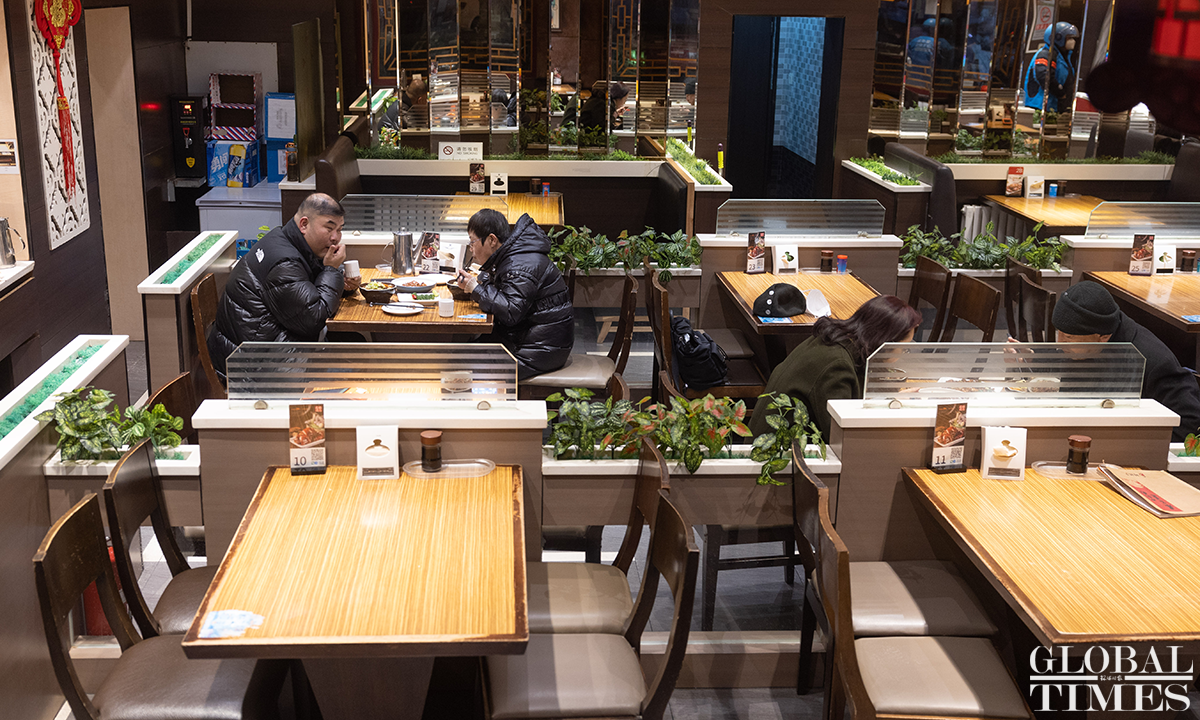
Photo: Li Hao/GT
China’s capital city Beijing, with a population of more than 21 million, on Tuesday announced
further optimized anti-COVID-19 measures including removing test requirements for some public venues, amid a consistent strategy and flexible measures in the face of the weakening Omicron variant. Experts said that the virulence and pathogenicity of the Omicron variant and its evolutionary branches are significantly reduced compared with the original strain.
Starting from Tuesday, residents in Beijing will no longer be required to present a negative nucleic acid test report before entering supermarkets, office buildings, parks and other public venues, and they only need to scan their health codes, said the Beijing authorities.
But for some
indoor entertainment venues such as internet cafes and bars, residents still need to show negative nucleic acid testing results obtained within 48 hours. Dine-in services also resumed on Tuesday, but customers need to show 48-hour negative results and scan their health codes.
Nearly 50 cities across the country have reportedly announced similar measures to relax COVID-19 test requirements for some public venues. Public health experts told the Global Times that these measures were adjusted dynamically and scientifically based on many factors including the “epidemic situation, virus virulence and pathogenicity and other medical supportive conditions,” which doesn’t mean that the country is loosening all COVID-19 restrictions following about three years of efforts against the virus.
What has happened in the past few years shows that China’s COVID-19 policy provided maximum protection for people’s lives and health, minimized the impact on socioeconomic development, and bought precious time for understanding the virus on the basis of science, for the research and development of vaccines and therapeutics, and for vaccinating more people across the country, Foreign Ministry spokesperson Mao Ning said at Tuesday’s press briefing.
“As has been proven by facts, China’s approach to COVID-19 over the past few years has been right, science-based and effective,” Mao said.
“The Omicron variant has become
less pathogenic and less likely to cause severe pneumonia. The raising of the vaccination rate also has lowered the risk of severe illness and death rate from COVID-19,” Li Tongzeng, a medical expert at Beijing's Xiaotangshan Hospital, told the Global Times on Tuesday.
However, it has become more difficult to prevent it since the variant spreads faster in a hidden manner, and the country has been seeking a balanced way to optimize prevention and control measures to combat the virus and minimize the impact on daily life, according to Li.
“Policies and measures will be adjusted dynamically according to the changed situation of the epidemic rather than a simple openness,” Li said.
On the basis of the ninth edition of China’s COVID-19 control protocols and newly released 20 measures, Chinese cities including Beijing, Shanghai, Guangzhou and Shenzhen have all issued optimized measures, with many announcing protective measures toward certain groups such as the elderly.
In Beijing, for instance, residents still need to present a 48-hour nucleic acid report and scan health codes before entering the elderly care institutions, child welfare institutions, in-patient medical institutions and schools.
Beijing will continue to provide free nucleic acid testing services at communities and vowed to meet the residents’ voluntary needs for testing, according to the authorities.
As of 3 pm on Tuesday, Beijing reported 1,431 new local COVID-19 infections including 122 detected at the community level, Beijing health authorities said. The city called for all its residents to protect themselves well, including wearing face masks, washing their hands, completing vaccination, keeping a healthy lifestyle and doing health monitoring.
“The current situation of the epidemic is quite grim considering the approach of the winter and it is expected that the peak of the epidemic has not yet come,” Wang Guangfa, a respiratory expert at Peking University First Hospital, told the Global Times on Tuesday.
“We oppose the one-size-fits-all approach for COVID-19 control, but necessary individual protection such as reducing large gatherings is still needed.”
Community transmission can affect vulnerable populations such as the elderly and those with underlying diseases, which may cause more severe cases and a shortage of medical resources, Wang noted.
To better use medial resources, another expert Wang Guiqiang, head of the department of infectious diseases at Peking University First Hospital, suggested that the ordinary COVID-19 patients can stay at home for medical observation, and the limited medical resources can be allocated to severe patients.




